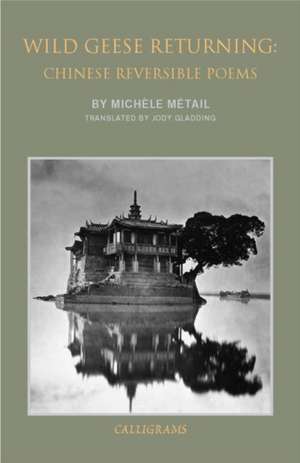Wild Geese Returning: Chinese Reversible Poems
Autor Michele Metail Jeffrey Yang Traducere de Jody Gladdingen Limba Engleză Paperback – 14 mar 2017
For nearly two thousand years, the condensed language of classical Chinese has offered the possibility of writing poems that may be read both forward and backward, producing entirely different creations. The genre was known as the "flight of wild geese," and the poems were often symbolically or literally sent to a distant lover, in the hope that he or she, like the migrating birds, would return.
Its greatest practitioner, and the focus of this critical anthology, is Su Hui, a woman who, in the fourth century, embroidered a silk for her distant husband consisting of a grid of 840 characters. No one has ever fully explored all of its possibilities, but it is estimated that the poem-and the poems within the poem-may be read as many as twelve thousand ways. Su Hui herself said, "As it lingers aimlessly, twisting and turning, it takes on a pattern of its own. No one but my beloved can be sure of comprehending it."
With examples ranging from the third to the nineteenth centuries, Michèle Métail brings the scholarship of a Sinologist and the playfulness of an avant-gardist to this unique collection of perhaps the most ancient of experimental poems.
Preț: 90.69 lei
Preț vechi: 114.43 lei
-21% Nou
Puncte Express: 136
Preț estimativ în valută:
17.36€ • 18.86$ • 14.59£
17.36€ • 18.86$ • 14.59£
Carte indisponibilă temporar
Doresc să fiu notificat când acest titlu va fi disponibil:
Se trimite...
Preluare comenzi: 021 569.72.76
Specificații
ISBN-13: 9789629968007
ISBN-10: 9629968002
Pagini: 312
Dimensiuni: 144 x 215 x 24 mm
Greutate: 0.4 kg
Ediția:Main
Editura: NEW YORK REVIEW OF BOOKS
ISBN-10: 9629968002
Pagini: 312
Dimensiuni: 144 x 215 x 24 mm
Greutate: 0.4 kg
Ediția:Main
Editura: NEW YORK REVIEW OF BOOKS
Notă biografică
Michele Metail, translated by Jody Gladding
Descriere
The genre of poems that may be read both forward and backward, producing different creations was known as the "flight of wild geese". These poems were often sent so that a distant lover, like the migrating birds, would return. With examples from the 3rd to the 19th centuries, Michele Metail describes reversible poems as "a singular adventure at the edge of meaning, of language, and of writing".
